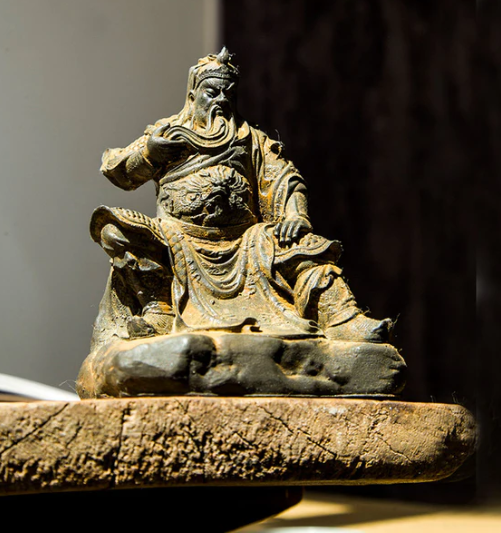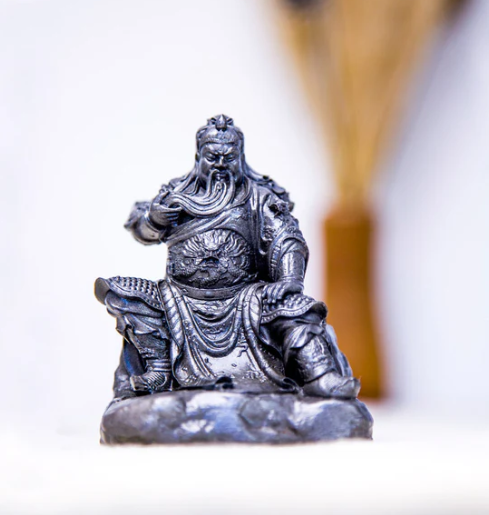Guan Yu: The Chinese Cultural Symbol of Faith and Morality
One of the most admired heroes in Chinese history is Guan Yu, sometimes referred to as Guan Di. In addition to being a well-known commander of the Shu Han during the Three Kingdoms era, he is also a cultural figure who represents valor, loyalty, and righteousness. His image transcends mythology and history and is ingrained in Chinese custom and society. Guan Yu has influenced Chinese culture for millennia, from the historical narratives in Records of the Three Kingdoms to the literary flourishes in Romance of the Three Kingdoms. He has come to represent the timeless values of bravery and loyalty.

Guan Yu’s Historical Roots: Heroism and Loyalty
Born in the late Eastern Han Dynasty, Guan Yu played a significant role in Liu Bei’s founding of the Shu Han dynasty. In the well-known “Peach Garden Oath,” he took an oath of brotherhood with Zhang Fei and Liu Bei, promising to defend the nation and bring about peace. Guan Yu became a famous hero because of his devotion to Liu Bei and his unyielding sense of justice.
Chen Shou’s Records of the Three Kingdoms describes Guan Yu as a man of great character and martial prowess. He was renowned for both his sense of justice and his valor in combat. His historical significance was solidified by his participation in multiple military operations, like as his defense of the Han and his well-known triumph over countless warlords. He gained the respect of his colleagues and the admiration of future generations for his unwavering devotion to Liu Bei, even in the face of adversity.
Guan Yu in The Three Kingdoms’ Romance: The Personification of Faith and Morality
The most well-known representation of Guan Yu can be found in Luo Guanzhong’s Romance of the Three Kingdoms, a book from the Ming Dynasty. Because of his epic battles and legendary deeds, Guan Yu is given almost mythical status in this literary work. His devotion, dignity, and justice are exalted throughout the book, making him a hero who personifies the principles of Chinese chivalry.
Guan Yu is portrayed in Romance of the Three Kingdoms as a virtually unbeatable warrior who possesses extraordinary bravery and fighting skills. Such tales as “Crossing Five Passes and Slaying Six Generals” and “The Lone Journey to Hanzhong,” which describe his deeds, present him as a hero of unparalleled bravery and strength. His persona, which has struck a chord with readers for ages, is centered on his steadfast sense of morality and his deep devotion to Liu Bei.
Guan Yu as a Cultural Icon: The Protective and Loyal God
Guan Yu’s image changed from that of a historical person to one of protection and loyalty as his renown expanded. In Chinese folk religion, he became a deity and is commonly regarded as the “God of War” or “God of Loyalty.” Throughout China, there are temples devoted to Guan Yu, also called Guan Di Temples, particularly in areas with close commercial relations where traders honor him as the guardian of their companies and families.
Guan Yu’s image in Chinese culture stands for societal peace, moral rectitude, and martial skill. In order to bring protection and good fortune, his statues are frequently exhibited in residences and commercial buildings. He was a figure of great cultural significance because of his function as a protector of the weak and a guardian of justice, especially when it came to loyalty to one’s family and nation.
The Impact of Guan Yu on Art and Literature
Guan Yu’s influence can be seen in Chinese literature, opera, and art in addition to history and religion. He is a well-known figure in traditional Chinese operas, especially Peking opera, where Guan Yu plays one of the most famous roles. In addition to having extraordinary martial arts abilities, actors playing Guan Yu must be able to embody the hero’s heroic grandeur and virtuous attitude.
Guan Yu’s influence is also felt in Chinese art, where his image appears in a range of mediums, including folk art, sculpture, and epic paintings. His commanding presence, honorable manner, and sense of obligation are all depicted in these images. His long beard, ferocious face, and grip of his trademark weapon—the Green Dragon Crescent Blade—are frequently used to represent his courage and unshakeable sense of justice.
The Impact of Guan Yu in Contemporary Times
Guan Yu’s influence endures in modern life; his legacy is not confined to the past. People are still motivated to fight for justice, morality, and character strength by his story. Guan Yu is now frequently seen as an example of moral rectitude, encouraging others to uphold their moral convictions and face difficulties head-on.
Many business owners and companies view Guan Yu as a sign of protection and wealth, and in order to assure success, they frequently display his sculptures in their stores or offices. In the business sector, where tenacity and moral rectitude are prized, his unshakable devotion and commitment to his cause continue to strike a chord.
In addition, Guan Yu’s lessons on loyalty and teamwork are still applicable today. His bonds with Liu Bei and Zhang Fei, his sworn brothers, show the value of cooperation and mutual trust—qualities that are critical in both personal and professional relationships.
The Importance of Guan Yu in the Modern World
The legacy of Guan Yu is still very relevant in the modern society. His tale serves as a reminder of the enduring values of justice, loyalty, and morality. Guan Yu, a representation of commitment and personal integrity, never stops encouraging people to conduct honorably and with integrity, even when faced with hardship.

Guan Yu has had a lasting and significant impact on Chinese civilization, whether as a historical person, a cultural icon, or a religious deity. From the customs of ancient worship to the values that guide contemporary society, his image continues to have an impact on people’s lives. The principles that have molded China for generations are reflected in Guan Yu’s sense of loyalty and morality, which continues to be a pillar of Chinese culture.
Guan Yu: The Eternal Hero in Conclusion
Generations of Chinese and others have been inspired by Guan Yu’s story, which is one of devotion, bravery, and honor. He is a timeless representation of moral rectitude and virtue because of his lasting legacy as a historical hero, religious leader, and cultural icon who personifies the principles of justice and righteousness. Guan Yu has made a lasting impression on Chinese society with his teachings and image, and his impact will never stop guiding and motivating people who aspire to live honorably and morally.
